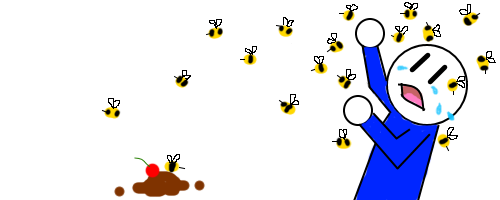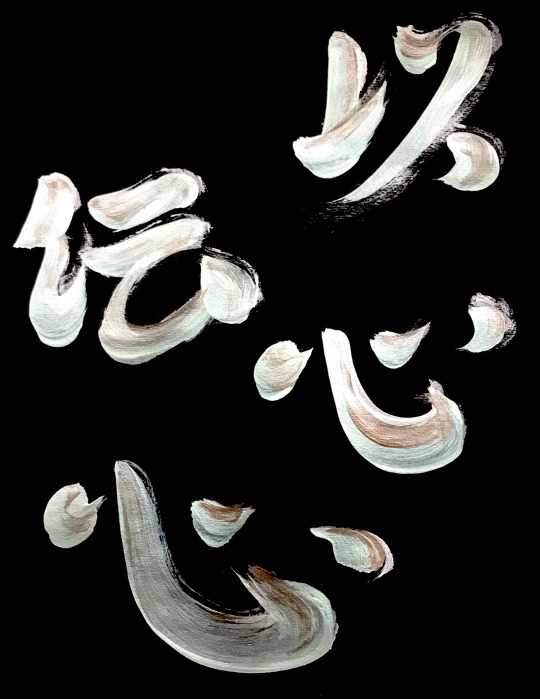#japanese idioms
Japanese saying of the week!
泣き面に蜂 (なきつらにはち)
When it rains it pours; salt in the wound; adding insult to injury
A saying for when something bad happens and then something ELSE bad happens on top of that.
- 泣き面(なきつら/nakitsura) crying face
- に(ni) at, on, in
- 蜂(はち/hachi) bee, wasp
So literally bees at a crying face
that is BRUTAL
Like, you’re ALREADY crying

AND THEN BEES

Post link
Japanese idiom of the week!
Look guys, I learned a saying today:
- 百聞は一見に如かず(ひゃくぶんはいっけんにしかず)
seeing is believing; a picture is worth a thousand words
Literally “a hundred listenings don’t equal one look”, because no matter how much you hear about something it’s just not the same as seeing it for yourself, even just for a little bit.
- 百聞(ひゃくぶん/hyakubun) “hundred” 百 plus “listen” 聞
- は (wa) makes 百聞 the topic of the sentence
- 一見(いっけん/ikken) one 一 look 見
- に (ni) to, at (here it’s helping say that hearing can’t reach tothe level of seeing)
- 如かず(しかず/shikazu) doesn’t reach, doesn’t equal, doesn’t live up to (如く is an old verb that I just now learned. It means “measure up to” or “equal”. The ず is an old way of negating a verb which works a lot like ない does in modern Japanese)
(somehow I have a feeling that Japanese idiom of the week is gonna be a thing for a little while haha)
Post link
This is one of many Japanese 四字熟語、yojijukugo, idioms written with four kanji characters. Some of them were adopted from existing Chinese cousins, but lots are unique to Japanese.
晴耕雨読seikouudoku, literally means to be “working in the fields during the good weather and reading during rainy weather,” but is interpreted to mean “dividing time quietly between your labors and intellectual pursuits/a quiet sort of life.”
I love finding idioms in languages I’m trying to learn, especially ones like these which are written in a certain way, because it almost feels more like memorizing little poems which you can recite in conversation.
This particular one comprises of the four kanji:
晴:read as せい sei;literally meaning, “clear up,” containing the radicals for “sun, daylight” and “blue;” it appears in many pleasant phrases referring to cheerful, refreshing, beautiful weather
耕:read as こうkou; literally meaning, “to till, cultivate,” made up of the radicals for “ploughing” and “town or community, or (sometimes) well;” exists mostly in compounds relating to agriculture
雨:read as うu; literally meaning, “rain;” the character itself is classified as a pictogram
読:read as どくdoku; literally meaning, “to read,” uses the radicals for “to say, tell” and “to sell;” although primarily meaning to read literally, as in books or written material, it may also suggest “reading someone’s heart, to predict or divine”
If anyone can add about how this is used, please do!!

不 = not
言 = speaking
実 = actually
行 = doing

The second and fourth character in this famous 4-character idiom are both 心, which means “heart”. This idiom refers to heart-to-heart communication; speaking without words.
*Every* moment can be a “once-in-a-lifetime” opportunity, if we make the most of it :)

七 = seven
転 = fall over
八 = eight
起 = get up
One of my favourite Japanese 4-character idioms!

The first character 猪 means “wild boar”, so the image is of a wild boar stampeding, not stopping until it has reached its destination.
My Japanese teacher taught me this “yo-ji-juku-go” (Japanese 4-character idiom) because both me and her were born in the year of the wild boar.


This is a “yo-ji-juku-go” (Japanese 4-character idiom), which describes how to live a peaceful yet productive life: work when it’s sunny, and rest when it rains. Doing everything in its proper season.


